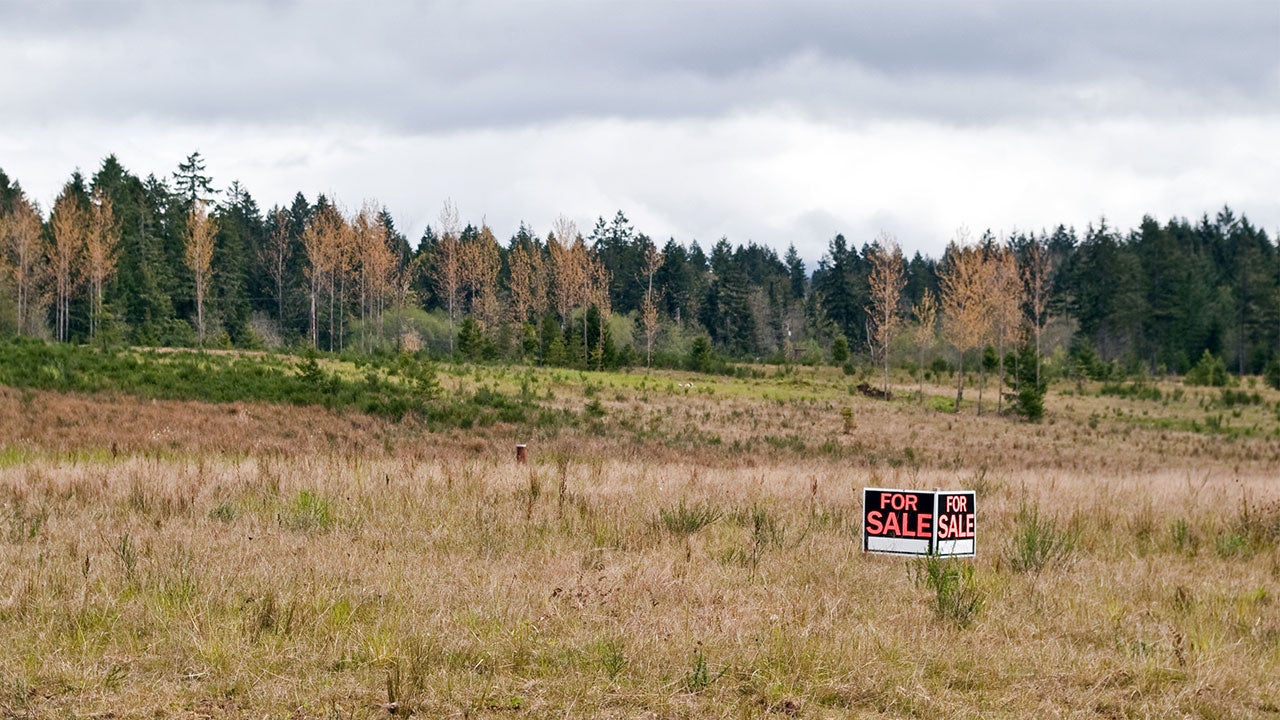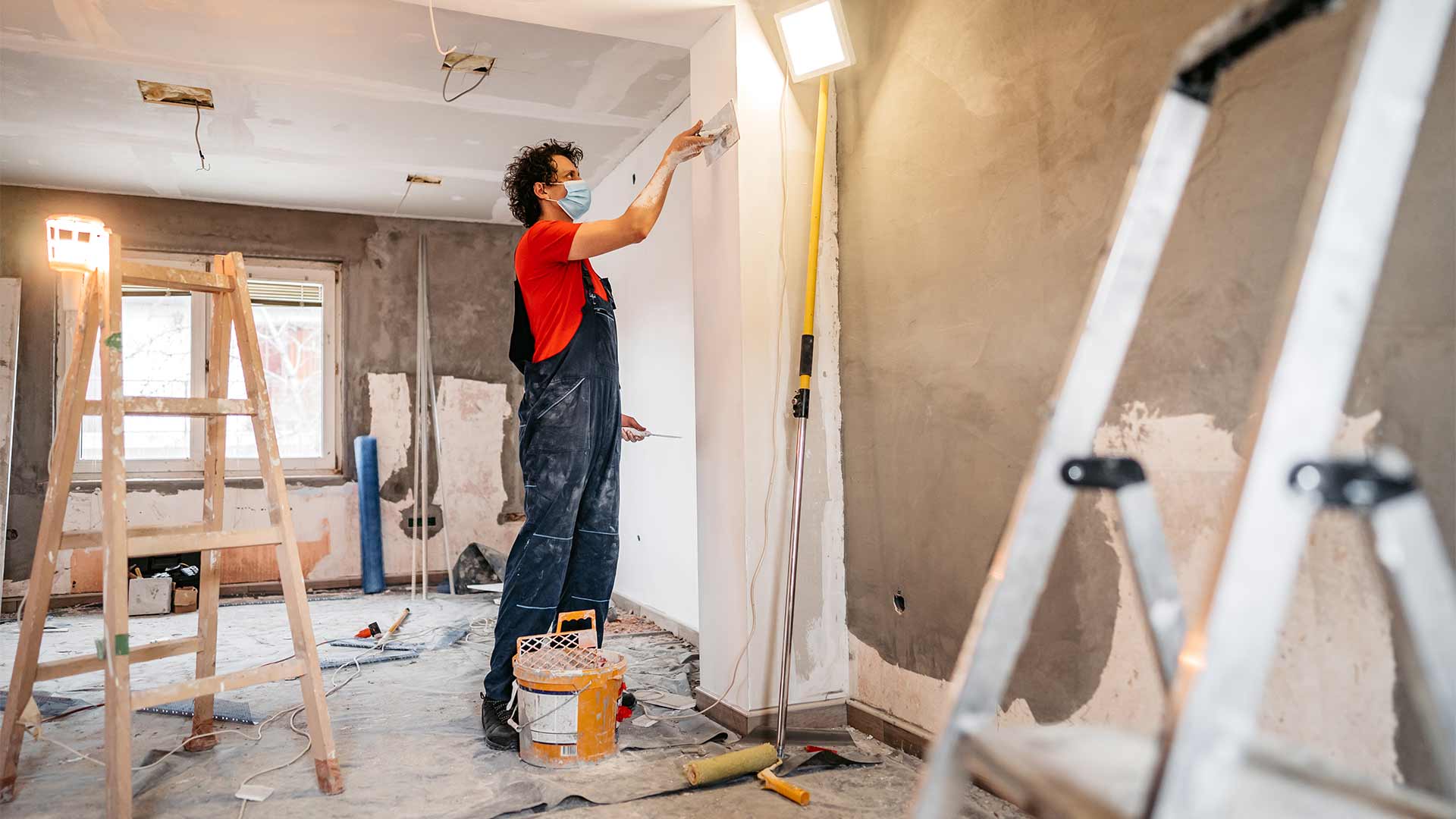

Finance
How To Buy Land With No Money And Bad Credit
Published: January 12, 2024
Learn how to buy land with no money and bad credit through creative financing options. Discover tips and strategies to overcome financial obstacles in the real estate market.
(Many of the links in this article redirect to a specific reviewed product. Your purchase of these products through affiliate links helps to generate commission for LiveWell, at no extra cost. Learn more)
Table of Contents
- Introduction
- Understanding the Challenges
- Researching Available Options
- Utilizing Seller Financing
- Exploring Lease Options and Land Contracts
- Seeking Government Assistance Programs
- Partnering with Private Investors
- Crowdfunding and Other Creative Funding Methods
- Building Credit for Future Land Purchase
- Conclusion
Introduction
Buying land can be an exciting venture, but it can also be a daunting task, especially if you don’t have the necessary funds or if you have a less than ideal credit score. However, don’t let that discourage you from pursuing your dream of owning land. With some creativity, research, and determination, it is possible to buy land even with no money and bad credit.
In this article, we will explore various options for purchasing land when traditional financing methods are not available. From seller financing to government assistance programs, we will delve into alternative routes that can help you achieve your goal of becoming a landowner.
While it’s important to note that each situation is unique, the strategies outlined here can provide valuable insights and ideas to help you navigate the process of buying land with limited funds and less-than-ideal credit. It’s essential to do thorough research, consult with professionals, and make informed decisions based on your specific circumstances.
So, if you’re ready to learn how to overcome the challenges of buying land with no money and bad credit, let’s dive in and explore the available options.
Understanding the Challenges
Before delving into the various options for buying land with no money and bad credit, it’s important to understand the challenges associated with such a situation. By being aware of the obstacles you may face, you can better prepare and navigate the process.
Firstly, having no money means that traditional financing options such as bank loans or mortgage programs may not be accessible to you. Banks typically require a down payment, and without sufficient funds, it can be challenging to secure a loan.
Secondly, bad credit can greatly affect your ability to obtain financing. Lenders rely on credit scores to assess the risk of lending money, and a low credit score can result in higher interest rates or being denied a loan altogether.
Furthermore, buying land without any funds for a down payment can present additional complications. Land is often seen as a riskier investment compared to properties with established structures, making it less attractive to lenders.
However, don’t despair. Despite these challenges, there are alternative options available that can help you overcome these obstacles and still make your dream of owning land a reality.
It’s crucial to have a clear understanding of your financial situation, credit score, and the specific challenges you face before exploring alternative methods to buy land. This knowledge will enable you to make informed decisions and approach the buying process strategically.
Now that you have a grasp of the challenges, let’s move on to exploring the various options you can consider when looking to buy land with no money and bad credit.
Researching Available Options
When it comes to buying land with no money and bad credit, thorough research is key. By exploring various options, you increase your chances of finding a solution that fits your unique circumstances. Here are some avenues to consider:
- Local foreclosures: Researching local foreclosure listings can be a viable option for buying land at a discounted price. Properties in foreclosure often come with more flexible financing options, including the potential for seller financing.
- Land auctions: Attending land auctions can provide opportunities to purchase land at reduced prices. Keep an eye on local government websites or consult auctioneers to stay informed about upcoming auctions in your area.
- Owner financing: Some landowners may be willing to offer financing options for their properties. This can involve negotiating a down payment and monthly installments directly with the seller. Consult with local real estate agents or browse online listings to find potential sellers offering owner financing.
- Land trusts: Research local land trusts or conservation organizations that may own or manage land in your desired area. These organizations may offer financing or lease options that are more accessible for individuals with limited funds and credit challenges.
- Land-sharing agreements: Consider connecting with individuals who own land and are willing to enter into a land-sharing agreement. This arrangement can involve sharing the responsibilities and benefits of owning the land, such as agriculture or homesteading, while reducing the upfront financial burden.
- Real estate investment groups: Joining local real estate investment groups can provide access to valuable resources and networks. Members may be knowledgeable about alternative land-buying methods or have investment opportunities that cater to individuals with financial constraints.
- Online platforms: Explore online platforms that connect buyers and sellers of land, such as land marketplaces and crowdfunding websites. These platforms can facilitate direct communication with sellers, making it easier to negotiate flexible financing options.
It’s important to conduct thorough due diligence when researching your options. Verify the credibility and reputation of individuals or organizations involved, carefully review contracts and financing terms, and seek professional advice when necessary. By being diligent in your research, you can uncover unique opportunities to buy land with no money and bad credit.
With a solid understanding of the available options, let’s explore some specific strategies you can employ, starting with seller financing.
Utilizing Seller Financing
One of the most common strategies for buying land with no money and bad credit is to utilize seller financing. This approach involves negotiating a financing arrangement directly with the landowner, bypassing the need for traditional lenders.
With seller financing, the landowner acts as the lender, allowing you to make regular payments to them over an agreed-upon period of time. This can be a mutually beneficial arrangement as it allows the seller to sell their land while providing you with an opportunity to purchase without the need for a substantial down payment or excellent credit.
When pursuing seller financing, here are some key steps to take:
- Identify motivated sellers: Look for landowners who may be more open to negotiating seller financing terms. This could include individuals facing financial hardships or those who have had difficulty selling their land through traditional methods.
- Initiate negotiations: Reach out to potential sellers and express your interest in their land. Discuss the possibility of seller financing and be prepared to outline the terms you’re seeking, such as the down payment amount, monthly installments, and interest rates.
- Seek legal assistance: It’s crucial to involve a real estate attorney to ensure that the seller financing agreement is legally sound and protects both parties’ interests. The attorney can help draft or review the contract, ensure proper documentation, and conduct a title search.
- Negotiate favorable terms: While the terms of seller financing may differ from traditional loans, you can still negotiate aspects such as the interest rate, repayment period, and any potential balloon payments. Aim to secure terms that are fair and manageable for your financial situation.
- Perform due diligence: Before finalizing the seller financing agreement, conduct thorough research on the property. This includes obtaining a survey, assessing any zoning restrictions or potential easements, and ensuring there are no outstanding liens or encumbrances.
- Execute the agreement: Once both parties agree on the terms, it’s crucial to ensure all aspects are documented in a legally binding agreement. This protects both the buyer and the seller throughout the duration of the financing arrangement.
Seller financing can be an excellent opportunity for individuals with no money and bad credit to buy land. However, it’s important to approach this option with caution and conduct proper due diligence to protect your interests. Remember to seek professional advice and consult with an attorney or real estate expert to guide you through the process.
Next, we will explore other alternatives, such as lease options and land contracts, which can also be viable options for acquiring land in unconventional ways.
Exploring Lease Options and Land Contracts
When buying land with no money and bad credit, lease options and land contracts can offer alternative paths to land ownership. These arrangements allow you to acquire and use the land while making periodic payments or lease payments that can eventually lead to full ownership.
Let’s take a closer look at these two options:
- Lease options: A lease option involves entering into a lease agreement with the landowner, which includes an option to purchase the land at a specified price within a predetermined timeframe. This allows you to lease the land while having the opportunity to buy it in the future. A portion of the lease payments may be credited toward the final purchase price.
- Land contracts: A land contract, also known as a contract for deed or installment sale agreement, is a financing agreement between the buyer and seller. In this arrangement, the buyer makes monthly payments directly to the seller, gradually paying off the purchase price over time. The buyer takes possession of the land while the seller retains legal title until the final payment is made.
When considering lease options or land contracts, here are some important factors to consider:
- Agreed-upon terms: Clearly define the terms of the agreement, including the purchase price, monthly payments, repayment period, and any conditions or contingencies.
- Legal assistance: Ensure all documents are legally sound and protect the rights of both parties involved. Consulting with an attorney who specializes in real estate transactions can help safeguard your interests.
- Property inspection: Conduct a thorough inspection of the land to assess its condition and suitability for your intended use. This includes verifying any restrictions, zoning regulations, or environmental considerations.
- Escrow accounts: Consider using an escrow account to hold the funds for the transaction. This provides an added layer of security for both the buyer and seller, ensuring that payments are properly accounted for and transferred.
- Clear title: Verify that the seller has clear title to the land and there are no outstanding liens or encumbrances that could affect your ownership rights.
Lease options and land contracts can offer flexibility and affordability, providing a steppingstone towards land ownership. However, it’s crucial to fully understand the terms and potential risks associated with these arrangements. Seek professional advice, conduct thorough research, and carefully review all contracts and agreements before committing to a lease option or land contract.
Next, we will explore government assistance programs that can provide additional support in acquiring land with limited funds and credit challenges.
Seeking Government Assistance Programs
For individuals looking to buy land with no money and bad credit, government assistance programs can be valuable resources. These programs are designed to provide support and opportunities for those who may face financial constraints. Here are some government assistance programs to consider:
- USDA Rural Development Programs: The United States Department of Agriculture (USDA) offers various programs that support rural development and land acquisition. The Single Family Housing Direct Loan Program provides affordable financing options for low-income individuals looking to purchase land in eligible rural areas.
- HUD Good Neighbor Next Door: The U.S. Department of Housing and Urban Development (HUD) offers the Good Neighbor Next Door program, which provides significant discounts on the purchase of eligible properties for teachers, law enforcement officers, firefighters, and emergency medical technicians. This can include land located in revitalization areas.
- State and Local Housing Assistance Programs: Many state and local governments have housing assistance programs that provide grants, subsidies, or affordable financing options for low-income individuals or families looking to acquire land. Research programs available in your specific area to explore potential opportunities.
- Community Development Block Grants (CDBG): The U.S. Department of Housing and Urban Development allocates funds to states and local governments through the CDBG program. These funds can be used for various community development purposes, including affordable housing initiatives that may help individuals with limited funds purchase land.
- Section 184 Indian Home Loan Guarantee Program: The Section 184 program assists Native American individuals and families in obtaining financing for the purchase, construction, or rehabilitation of homes and land on trust or restricted Indian land.
When seeking government assistance programs, it’s important to determine your eligibility, understand the specific requirements, and follow the application process diligently. Be prepared to provide necessary documentation and comply with any income or credit guidelines set forth by the programs.
Additionally, reach out to local housing agencies, nonprofit organizations, or housing counseling agencies that can provide guidance and support throughout the process. These entities often have in-depth knowledge of available assistance programs and can help you navigate the application process successfully.
Government assistance programs can provide the financial backing needed to overcome the challenges of buying land with no money and bad credit. Research the programs available in your area and determine the ones that align with your needs and goals.
Next, we will explore partnering with private investors as another potential avenue for acquiring land.
Partnering with Private Investors
Partnering with private investors can be a viable option for individuals looking to buy land with no money and bad credit. Private investors are individuals or groups who are willing to provide financial support in exchange for a share of ownership, profit, or other mutually beneficial arrangements.
Here’s how you can explore partnering with private investors:
- Identify potential investors: Research local real estate investment groups, networking events, or online platforms that connect investors with potential investment opportunities. Seek investors who have an interest in land acquisition or are open to alternative financing arrangements.
- Develop a compelling proposal: Create a comprehensive proposal that outlines your vision, potential returns, and how the investor’s contribution will be utilized. Highlight your unique selling points and demonstrate the potential profitability or growth of the land venture.
- Network and build relationships: Attend real estate networking events, join investment groups, and engage with professionals in the industry who may have connections to private investors. Building relationships and establishing trust can increase your chances of finding suitable investment partners.
- Consider joint ventures: Joint ventures involve partnering with investors who provide the financial resources while you contribute your expertise, labor, or management skills. This can be a win-win situation where both parties share the risks and rewards.
- Maintain clear communication: When partnering with private investors, maintain open and transparent communication. Clearly define roles, responsibilities, profit-sharing arrangements, and exit strategies in a legally binding partnership agreement.
- Seek legal and financial advice: Before entering into any partnership agreements or financial transactions, consult with an attorney and financial advisor who specialize in real estate investments. They can provide guidance and ensure that the terms of the partnership are favorable.
Partnering with private investors can provide the necessary capital to acquire land while leveraging your skills and expertise. However, it’s essential to approach these partnerships with caution and conduct thorough due diligence on potential investors. Verify their track record, financial capacity, and ensure that their investment goals align with yours.
By connecting with private investors who are interested in land acquisition, you can potentially secure the funding needed to purchase land, even with no money and bad credit.
Next, we will explore crowdfunding and other creative funding methods that can help you overcome financial barriers in buying land.
Crowdfunding and Other Creative Funding Methods
When it comes to buying land with no money and bad credit, crowdfunding and other creative funding methods can offer alternative avenues to secure the necessary funds. These strategies tap into the power of the crowd and innovative financing solutions. Here’s what you can consider:
- Crowdfunding: Crowdfunding platforms allow individuals to raise funds for various projects, including land acquisition. Create a compelling campaign that clearly articulates your vision and explains how the funds will be used. Offer incentives and rewards to encourage people to contribute to your campaign.
- Social lending: Social lending platforms connect borrowers with individuals willing to lend money. By presenting your land acquisition plans and demonstrating your ability to repay the loan, you may attract lenders who are willing to provide the necessary funds.
- Personal loans: Consider approaching family and friends who may be willing to lend you the funds needed to purchase the land. Communicate your plans and repayment terms clearly, and formalize the loan agreement to avoid any potential misunderstandings.
- Part-time employment or side hustles: Supplementing your income through part-time employment or side hustles can help you save money for a down payment or for ongoing land payments. Explore opportunities that align with your skills and time availability.
- Bartering or trade: Explore the possibility of bartering or trade arrangements where you offer your skills, products, or services in exchange for the land you desire. This creative approach allows you to acquire the land without relying solely on financial resources.
- Land sharing or co-ownership: Consider partnering with like-minded individuals who are also looking to acquire land. By pooling your resources and sharing the costs, you can collectively purchase the land and divide its use among the co-owners.
- Save and budget: Implement a strict savings plan and budget to set aside funds for land acquisition. Cut unnecessary expenses, explore cost-saving measures, and diligently save towards your goal over time.
These creative funding methods may require time, effort, and resourcefulness, but they can provide a pathway to buying land when traditional financing is unavailable. Be proactive, think outside the box, and leverage your skills and resources to secure the funds needed for land acquisition.
Remember, it’s important to approach creative funding methods with proper planning and diligence. Evaluate the feasibility and risks associated with each method, and be prepared to adapt your strategy as necessary.
Now that we’ve explored various alternatives for funding land purchase, let’s discuss the importance of building your credit for future land acquisitions.
Building Credit for Future Land Purchase
If you’re currently unable to buy land due to bad credit, it’s essential to focus on improving your creditworthiness for future opportunities. Building good credit not only expands your financing options but also puts you in a stronger position to negotiate favorable terms. Here are some strategies to consider:
- Review your credit report: Obtain a copy of your credit report from the three major credit bureaus (Equifax, Experian, and TransUnion). Carefully review the report for errors, incorrect information, or discrepancies that may be negatively impacting your credit score. Dispute any inaccuracies to have them corrected.
- Pay bills on time: Payment history is a significant factor in determining your credit score. Make a conscious effort to pay all your bills, including credit cards, loans, and other debts, on time. Consider setting up automatic payments or reminders to ensure you never miss a payment.
- Reduce outstanding debt: High levels of debt can negatively impact your credit score. Develop a plan to pay down your existing debts, starting with those that carry the highest interest rates. Consider consolidating or negotiating with creditors for more favorable repayment terms.
- Use credit responsibly: Avoid maxing out your credit cards or applying for multiple lines of credit at once. Instead, use credit sparingly and responsibly. Keep your credit utilization ratio (the amount of credit you’re using compared to your available credit) below 30%.
- Establish a credit history: If you have no credit history or limited credit, consider opening a secured credit card or becoming an authorized user on someone else’s credit card. Timely payments and responsible credit use will help you establish and build your credit history.
- Monitor your credit: Regularly monitor your credit score and track any changes. Many online platforms and credit card issuers offer free credit score monitoring. Staying informed about your credit profile allows you to address any issues promptly and proactively.
- Seek professional advice: Consider consulting with a credit counselor or financial advisor who specializes in credit repair and building credit. They can provide personalized guidance and help you develop a strategy to improve your credit score.
Building good credit takes time and persistence, but the effort is worthwhile. As your credit improves, you’ll have more financing options available for future land purchases and other financial goals.
Remember that building credit is a long-term process, and results may not be immediate. It’s important to stay committed to responsible credit management habits and continue striving for improvement.
Now that we’ve explored ways to improve your credit, let’s summarize the key points covered in this article.
Conclusion
Buying land with no money and bad credit may present challenges, but it’s not an insurmountable obstacle. By exploring alternative options, conducting thorough research, and taking proactive steps, you can still achieve your dream of land ownership.
We discussed various strategies, including utilizing seller financing, exploring lease options and land contracts, seeking government assistance programs, partnering with private investors, and utilizing crowdfunding and other creative funding methods. Each approach offers its own advantages and considerations, so it’s important to assess which option aligns best with your goals and circumstances.
Additionally, we emphasized the importance of building credit for future land purchases. Taking steps to improve your creditworthiness will expand your financing opportunities and provide better terms when negotiating for land acquisition.
Remember, throughout this process, it’s crucial to conduct thorough research, seek professional advice when necessary, and exercise caution in all financial transactions. Be diligent in reviewing contracts, understanding terms and conditions, and ensuring that you protect your rights and interests.
Buying land is an exciting and fulfilling endeavor, and with determination and resourcefulness, you can overcome financial constraints and achieve your goal. Stay committed to your vision, adapt to challenges, and make informed choices along the way.
So, don’t let financial barriers deter you. Take the knowledge and ideas shared in this article and take the necessary steps to make your dream of buying land a reality.














